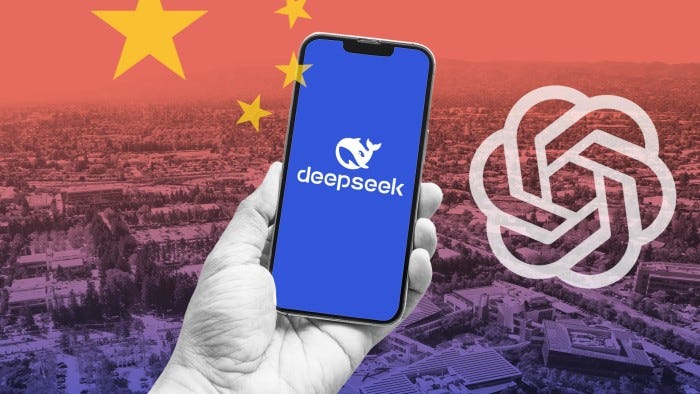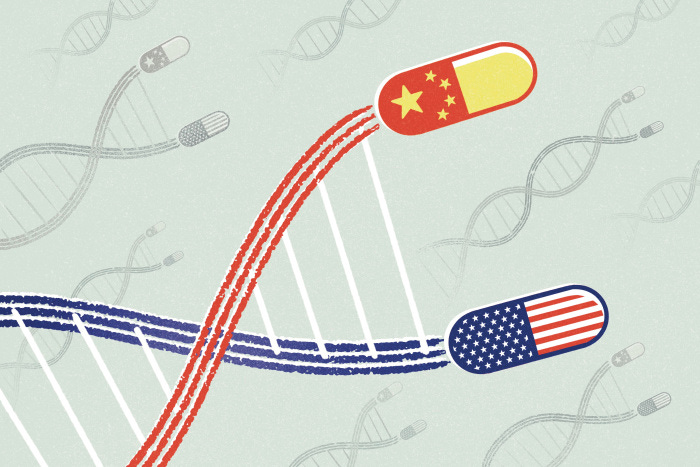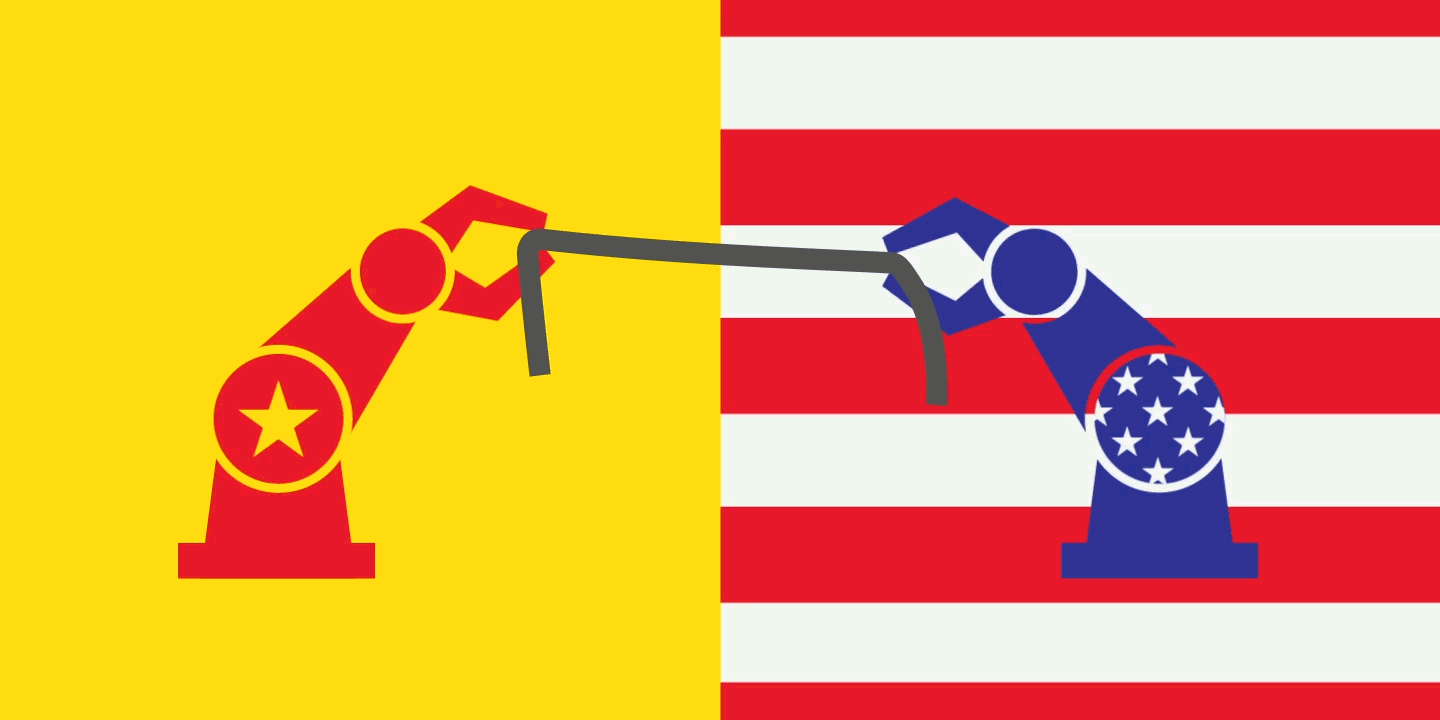AI: Drug industry another example of 'DeepSeek'type China competition. RTZ #626
...US can win vs China with minimal trade and investment curbs, in AI and beyond
The Bigger Picture, Sunday, February 9, 2025
I wrote a lot over last two weeks and Sundays on the lessons and opportunities from China’s ‘DeepSeek moment’ for the US. One of the most pointed lessons (no. 4 here), is that the US benefits more with unfettered global playing fields in tech and AI. In particular, I discussed the ‘constraints’ driven innovations that DeepSeek (point no. 2) was able to drive vs peers in the US. A strategy that has been the staple of most previous tech waves.
It’s logical that this extends to other industries that will soon also be driven by innovations from this AI Tech Wave. The Drug and Healthcare industry in China provides one such vivid example. That is the Bigger Picture I’d like to discuss this Sunday.
The WSJ lays it out in “The Drug Industry is Having its own DeepSeek Moment”:
“It isn’t just artificial intelligence—Chinese biotechs are now developing drugs faster and cheaper than their U.S. counterparts.”
“The biotech industry’s DeepSeek moment came last fall.”
“That is when Summit Therapeutics, backed by billionaire Bob Duggan, announced that its drug had outperformed Merck’s blockbuster therapy Keytruda in a head-to-head lung-cancer trial. Keytruda, a $30 billion-a-year immunotherapy juggernaut, is the bestselling drug in the pharma industry and has long dominated the market. So the prospect of a superior competitor was seismic. Even more remarkable: Summit had licensed the drug just two years earlier from a little known Chinese biotech called Akeso.”
“The news added billions of dollars to Summit’s market capitalization, catapulting it into biotech’s upper ranks despite having no approved drugs. While Summit’s drug still hasn’t received U.S. regulatory approval, the results were a watershed moment for the industry, underscoring the competitive threat emanating from China.”
China has been making progress in biotech in a slow, steady and focused manner for a long time now:
“China’s rise in biotech has been years in the making, but it is now impossible to ignore. In 2020, less than 5% of large pharmaceutical transactions worth $50 million or more upfront involved China. By 2024, that number had surged to nearly 30%, according to DealForma. A decade from now, many drugs hitting the U.S. market will have originated in Chinese labs.”
And the tech comparisons abound:
“China’s biotech boom mirrors its rise in tech. In both cases, China has moved up the value chain, from manufacturing goods to becoming a more sophisticated hub for innovation, competing in industries once dominated by the U.S. There are several reasons for the industry’s growth. For one, many top scientists trained in the U.S. have returned to China over the past decade, fueling the emergence of biotech hubs around Shanghai. And just as DeepSeek built a formidable chatbot—allegedly on a lean budget with limited access to semiconductors—Chinese biotech companies are also scrappier, capitalizing on a highly skilled, lower-cost workforce that can move faster.”
“Additionally, companies can conduct clinical trials at a fraction of what they would cost in the U.S., while recent changes in the Chinese regulatory system have streamlined and accelerated the approval process to get a study started.”
And like DeepSeek did in AI, China’s drug companies are doing in pharmaceutical innovations: incremental progress, leveraging constraints, be they around capital, technology, or regulations:
“For now, much of China’s biotech innovation is incremental rather than groundbreaking. Many companies focus on improving existing drugs—tweaking the chemistry, enhancing efficacy or differentiating them in key ways.”
And changing the template vs US investors and biotech companies:
“But Chinese innovation is steadily improving and is already starting to disrupt the U.S. drug-development ecosystem. For decades, the U.S. biotech industry has thrived in hubs such as Boston-Cambridge and the San Francisco Bay Area, fueled by talent streaming from top academic centers like Massachusetts Institute of Technology and Stanford University. Those biotech companies have an insatiable client in Big Pharma, which is willing to pay top dollar for new drugs to replace those going off-patent.”
And US investors and companies are noticing and modifying their game:
“While that isn’t going away, chief executives of large pharmaceutical companies are broadening their horizons. Why spend $10 billion acquiring a U.S. biotech with a mid-stage drug when a similar molecule can be licensed from China for a fraction of the price?”
Of course the benefits here accrue to patients here and everywhere:
“From a patient’s perspective, the growing global competition is a win. People with cancer probably don’t care which country a drug was developed in. What matters is that it works. But for policymakers focused on maintaining America’s competitive edge, China’s biotech surge is a wake-up call. The innovation race isn’t limited to AI or crypto—it extends deep into life sciences.”
This example of the drug industry in China having its DeepSeek moment, is a timely one indeed. One which the US is also seeing in other industries vs China, like Robotics, EVs/Autos, Drones, and many other areas to come.
In all of them, the Bigger Picture is that we’re likely better off competing globally, including with China, than holding them off temporarily with trade and investment curbs.
Ultimately, the US advantage for companies and investors is their freedom and flexibility to compete globally, while leveraging unique US institutional advantages in technology innovation, financial infrastructure, and legal frameworks.
And that is something that can still beat China in any race, in the long term. With minimal trade and investment curbs.
Doing this with the AI Tech Wave and other industries, is the real long-term Bigger Picture opportunity. Stay tuned.
(NOTE: The discussions here are for information purposes only, and not meant as investment advice at any time. Thanks for joining us here)









